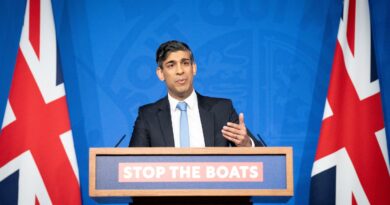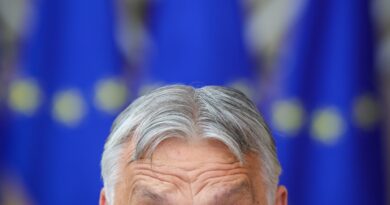Blinken arrives in Beijing amid deep fissures in U.S.-China relations
China’s foreign minister, Qin Gang, warned Blinken that he should “show respect” during a pre-trip phone call, and made clear his view that Washington alone was responsible for the abysmal state of relations.
But U.S. officials said Blinken remained hopeful that the two nations could move beyond feuding rhetoric and make progress on establishing regular lines of communication — a modest objective given the many existing disagreements over trade, human rights, Taiwan, Hong Kong and cybersecurity.
Last month, President Biden predicted a thaw in China’s anger over the U.S. downing of its high-altitude surveillance balloon in February. The White House has indicated that Blinken’s trip could unlock meetings between U.S. and Chinese officials, including a leader-to-leader engagement with President Xi Jinping.
“I’m hoping that over the next several months I’ll be meeting with Xi again, and talking about legitimate differences we have but also how … to get along,” Biden told reporters before leaving to Philadelphia.
When asked about Blinken’s frosty welcome from Chinese officials, a senior State Department official said the secretary is “well aware of the current state of the bilateral relationship” and underscored that both sides would be “candid” in expressing their concerns.
Blinken arrived in the early morning with a full agenda: meetings with Gang; the Communist Party’s top foreign policy official, Wang Yi; U.S. business leaders; American embassy personnel; exchange students; and potentially Xi himself.
Besides improving communications, Blinken’s team is interested in working on increasing the number of commercial flights between the United States and China and finding ways to lessen the U.S. fentanyl crisis given that many of the narcotic’s precursors come from China, said the senior State Department official, who like others spoke on the condition of anonymity to discuss sensitive diplomatic planning.
Blinken will square off with his counterparts at Beijing’s famed Diaoyutai State Guesthouse, a lavish complex that hosted President Richard M. Nixon a half century ago during his historic outreach to China.
Like then, the United States has driven the push for engagement with China — but the power dynamic has shifted dramatically in the intervening decades.
Many times wealthier and more globally connected than it was in the 1970s, China has been flexing its diplomatic muscles recently, brokering a rapprochement between regional rivals Saudi Arabia and Iran, hosting French President Emmanuel Macron and European Commission President Ursula von der Leyen, and flirting with the role of peacemaker on the Middle East and the war in Ukraine.
The diplomatic streak has Beijing projecting confidence and independence, but it can ill afford a long standoff with Washington.
Facing an economic slowdown, soaring youth unemployment and an anemic investment climate, Chinese officials are keen to host Treasury Secretary Janet L. Yellen and Commerce Secretary Gina Raimondo to address U.S. technology restrictions on China and other economic matters. As part of this pro-business push, Xi met with Microsoft co-founder Bill Gates on Friday — a meeting that followed visits to Beijing by JPMorgan Chase CEO Jamie Dimon, Starbucks CEO Laxman Narasimhan and Tesla and Twitter CEO Elon Musk.
But rather than acquiesce to Chinese preferences that top U.S. economic advisers travel first, the White House insisted that Blinken, one of Biden’s closest confidantes, be the first to Beijing, according to people familiar with the negotiations.
As a result, Chinese officials view the Blinken visit as a necessary step to unlock follow-on meetings with more immediately desired officials who focus on economic matters, analysts said.
“The most that can be hoped for is the Blinken visit sets the stage for later visits by Secretaries Yellen and Raimondo,” said David Dollar, a senior fellow at the Brookings Institution. “China’s concerned about various trade and technology restrictions but [Blinken’s team] are not the right people to negotiate on those issues.”
Overall, U.S. officials are telegraphing low expectations for the trip and downplaying the likelihood that it will be the start of a major rapprochement.
“We’re not going to Beijing with the intent of having some sort of breakthrough or transformation in the way that we deal with one another,” Daniel Kritenbrink, the top U.S. diplomat for East Asia, told reporters on Wednesday.
Chinese officials have set an even lower bar, accusing Washington of sending mixed messages about where it wants to take the relationship. “The U.S. side asks for communication on the one side, yet on the other, suppresses and contains China by every possible means,” said a spokesperson for the Chinese Foreign Ministry last month.
Over the course of the visit, Blinken will be pushed in several different directions from key players inside and outside of his meetings.
Top Republicans in Congress are already second-guessing his decision to travel to China. “Once we’re there, we’re beholden to an entirely new process of concessions because of the pressure to present ‘deliverables,’” said Rep. Mike Gallagher (Wis.), the chairman of the Select Committee on the Chinese Communist Party, in a column for the Wall Street Journal.
Michael McCaul (R-Tex.), the chairman of the House Foreign Affairs Committee, criticized Blinken for not imposing new penalties and export controls on China, and instead pursuing “fruitless talks.”
But during Blinken’s meetings with U.S. business leaders, he is expected to receive encouragement for pursuing a more accommodating approach to China, which has been furious at the Biden administration’s penalties on Chinese companies and restrictions on sensitive technologies, including advanced semiconductors.
Given the $700 billion in trade between the United States and China, the U.S. business community “remains focused on the importance of the relationship,” said the senior State Department official.
“U.S. businesspeople are likely to ask for a reduction in tensions so there is lower risk and lower acrimony for their businesses in China,” said Daniel Russel, a China expert at the Asia Society.
The most urgent goal for U.S. officials is restoring military-to-military channels with Beijing following multiple dangerous close calls in recent months, including a near-collision of warships near Taiwan and an aggressive fighter jet flyby over the South China Sea.
Beijing recently rejected a U.S. offer for Defense Secretary Lloyd Austin to meet his Chinese counterpart, Li Shangfu, doubting the “sincerity” of the invitation. Chinese officials are still upset about punishments the United States imposed on Li in 2018 for buying arms from Russia. They also view Washington’s deployment of air and naval assets to the South China Sea as an affront to China’ssovereignty, and believe that improving communications with Washington will simply make the Pentagon more comfortable operating in East Asia, say analysts.
“The United States has gotten very used to using international waters and airways to do intelligence and reconnaissance for decades,” said Michael O’Hanlon, a military scholar at the Brookings Institution. “We do this constantly 20 miles off the Chinese coast — and they’re typically not 20 miles off our coast.”
“We Americans like it that way — we don’t really believe in playing fair or having a level playing ground when it comes to who gets to snoop on whom,” he added. “All this stuff is going to stay tense.”
Despite the opposing outlooks, Blinken’s team believes it can make progress with China on increasing at least some official engagement on the trip. “I can say with great confidence there is a recognition on both sides that we do need to have senior-level channels of communication,” said the senior State Department official.
A key question during Blinken’s visit is whether the deep mistrust between the U.S. and Chinese officials spills into public as it did during their first meeting in Alaska, shortly after Biden took office. With nationalist sentiment running high in both countries, neither side can be expected to back down or shrug off a perceived slight. Observers will be watching whether Blinken reiterates his view that China is carrying out genocide against the country’s Uyghur minority in Xinjiang province — a charge Beijing strenuously denies.
While Chinese officials may refrain from any public scolding of Blinken while appearing next to him, state media outlets are unlikely to hold back.
“I expect that the Chinese media will continue to be uncharitable to Secretary Blinken during and after the visit,” said Ryan Hass, a China expert and former Obama administration official. “It’s going to be a test of discipline for Secretary Blinken and his team to tune out the noise and focus on the message that the Chinese are conveying behind closed doors.”




